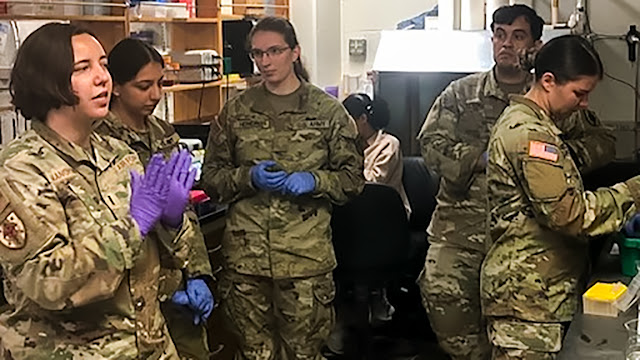Graduate Students at USU “Pay it Forward” for Medical Students during Summer Research Operational Experience Workshop Series
The research workshops encourage students to explore scholarly work within the different departments and centers at the Uniformed Services University.
 |
Hyun Lee, in the middle wearing gloves, demonstrates the proper technique of transferring proteins from a gel for western blotting. (Photo courtesy of Dr. Martin Ottolini) |
September 17, 2024 by Hadiyah Brendel
Graduate students from the Uniformed Services University (USU) designed and executed a skills lab to teach basic science techniques to more than a dozen medical students during their research Summer Operational Experience (SOE). The SOE is an operational clerkship which provides medical students with additional operational context over the summer months as part of their pre-clerkship curriculum. The SOE gives students an opportunity to explore service-specific operational medical assignments and careers, and improve skills utilized in support of military units.
Physician-scientist (MD/PhD) students in USU’s chapter of the American Physician Scientist Association (APSA) sponsored the research workshop. APSA is a national organization for physician-scientist trainees that provides dedicated support and opportunities at all levels of education. The student leaders of the USU chapter have made it their priority to better integrate the medical and basic science graduate programs, providing a more well-rounded education for students at the university.
Developed by MD/PhD candidates Air Force 2nd Lt. Cecelia Mangione (a molecular and cell biology graduate student), Army 2nd Lt. Savannah Kounelis-Wuillaume (a neuroscience student), and Army 2nd Lt. Katherine Lee (an emerging infectious disease student), in collaboration with Dr. Martin Ottolini, the assistant dean for Medical Student Research, some of the molecular biology and cell culture methods covered included polymerase chain reaction, gel electrophoresis, and bacterial and mammalian cell culture.
 |
2nd Lt. Cecelia Mangione (left) teaches students about the various applications of PCR in the biomedical sciences. (Photo courtesy of Dr. Martin Ottolini) |
Ottolini stresses the significance of graduate students establishing this workshop. “In the fast-paced and demanding nature of our modern curriculum, medical students have less opportunities to spend time interacting with our scientists who play a vital role in foundational and translational research. This workshop is one opportunity to expose USU medical students to the extensive research activities on campus that contribute to the greater mission of military medicine,” he says.
Enthused to gain practice with these fundamental techniques, the medical students engaged in an experience which aimed to both increase student familiarity with these tools and procedures, and to build ties across the basic and clinical academic communities, enhancing the multidisciplinary team approach to meeting warfighter needs where medical and graduate students will partner in their future careers.
“Many of the students expressed amazement at the extent and capabilities of USU's research enterprise," says Ottolini.
 |
Brendan Melvin (right) guides students through the process of splitting cells for maintenance of mammalian cell culture. (Photo courtesy of Dr. Martin Ottolini) |
Mangione delivered the workshop along with molecular and cell biology research associates and graduate students Ms. Hyun Lee and Mr. Brendan Melvin. These workshops became part of the Summer Introduction to DOD Research for class of 2027 students. Conducted on July 10th, students rotated through four sessions of different basic science techniques and main applications in biomedical research.
Melvin reiterates Mangione’s sentiment that “not only did we gain valuable teaching experience, but we also had the opportunity to connect with our peers on a deeper level and foster a collaborative learning environment.” She continues,”I would definitely consider continuing this initiative in the future, as it is a valuable experience for everyone involved, and also a lot of fun!"
Student participants in the workshop shared positive feedback which helps ensure that these activities are supported in the future.
“We hope that this workshop will encourage students to explore this type of scholarly work within our departments and centers during their later elective time periods and future careers,” says Ottolini.




